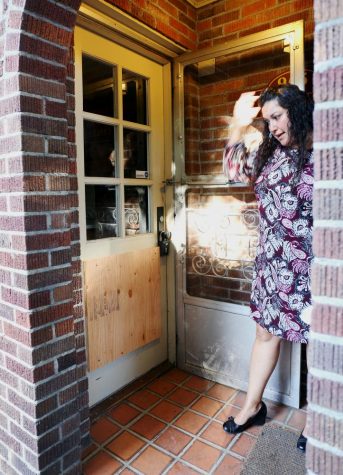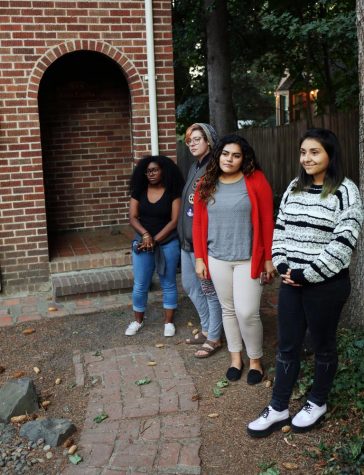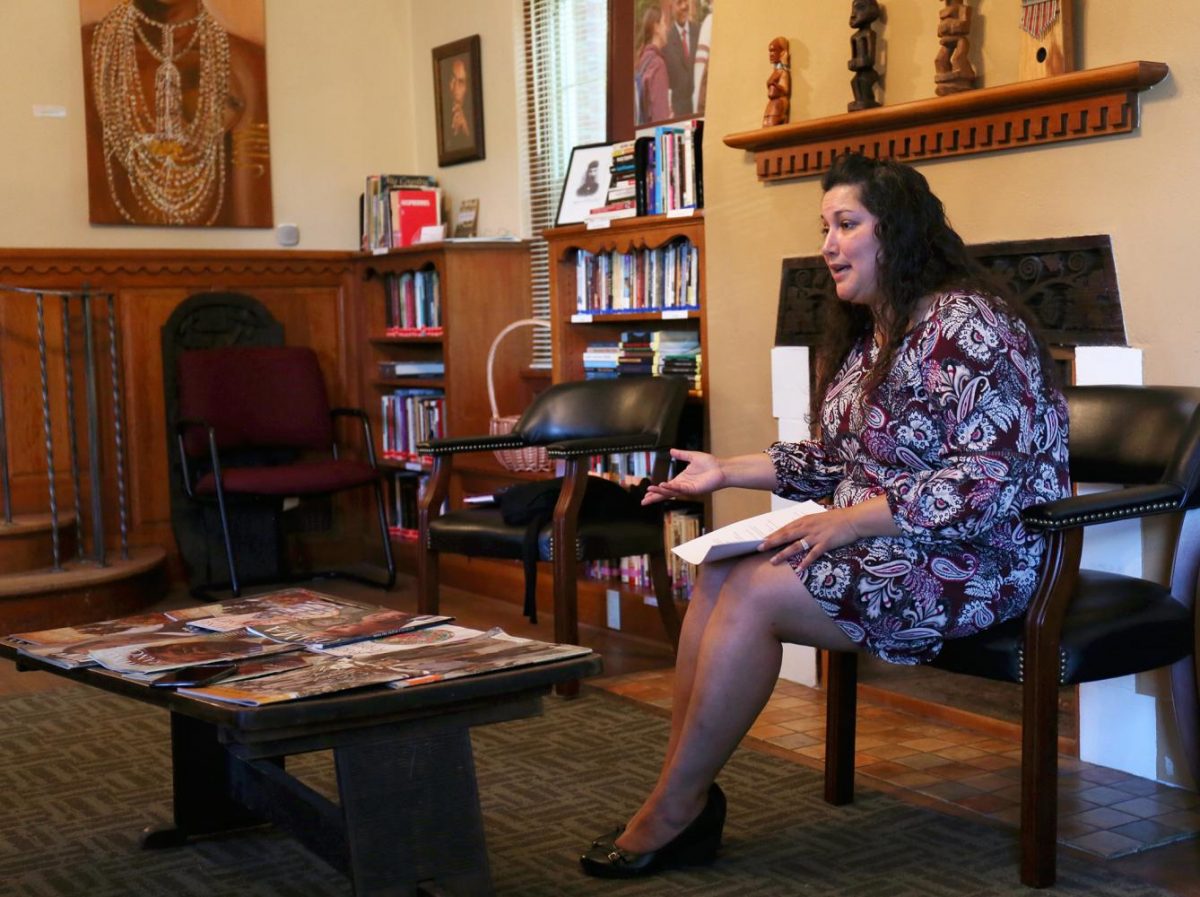‘The houses serve a different purpose’
Budget cuts to the Cultural Heritage Houses, leaving some uncertain about the properties future
ABBY LINNENKOHL | The Daily Evergreen
Maria de Jesus Dixon, Manager of Operations for the Culture and Heritage Houses and the Elson S. Floyd Cultural Center, describes her position and the importance of the Heritage Houses.
October 2, 2017
The original wood flooring of the Talmadge Anderson Heritage House creaks as Maria de Jesus Dixon enters the living room Tuesday afternoon.
Dixon’s office, like many others in the Office of Equity and Diversity, is housed in the historic structure situated in the heart of Greek Row. Dixon manages operations for all four of the Culture and Heritage Houses.
She flurries around the room, pointing out the influential African-American figures that adorn the walls: Martin Luther King, Jr., Frederick Douglass, Harriet Tubman, late WSU President Elson S. Floyd.
She turns her attention toward wooden built-ins that surround the mantel.
“Everything that you see in here has been donated,” she says, describing the antiquated books that line the shelves. Sections of the library are dedicated to renowned black authors August Wilson and Langston Hughes. She says some of the donated novels have been valued at up to $1,000.

Maria de Jesus Dixon discusses the broken door of Casa Latina on Tuesday.
The Culture and Heritage Houses and their historic content face an uncertain future after a 58-percent budget cut to their funding this semester.
Dixon says Floyd intended for the houses to celebrate diversity in the wake of the campus’ changing demographics. WSU’s minority enrollment for this fall is at an all-time high of 29.1 percent.
The Office of Equity and Diversity reports to Provost Daniel J. Bernardo, who Dixon says sent out an email describing cuts across all of his reporting units.
Bernardo says despite the reduced budgets, the Office of Equity and Diversity received a $60,000 allocation above their base budget. He says Jeff Guillory, interim executive director of the Office of Equity and Diversity, determines how to distribute these funds within the office. Bernardo explains that the university is facing a tight financial situation and that adjustments across departments have been made without significantly affecting programming.
Although the budget cut does not affect maintenance of the houses, it does affect the staff working for the houses, as well as the programming the office can provide. Dixon employs four student assistants who work events held in the homes and attend to any cleaning they may require. The budget also covers the office’s Freedom School program, in addition to the funds for the Martin Luther King, Jr. Committee.
All other intensive maintenance of the houses is funded by WSU Facilities Services as determined by the Real Estate Office. Dixon says she finds herself submitting about five work requests for the houses per month due to their historic state.
Dixon has heard rumors of the university considering selling the properties since she took her position in December 2014, she explains. For this reason, she finds herself balancing finances and admits that she could improve marketing for the houses.
“I can’t give you a yes or no because ultimately that is not my decision,” she says, in reference to the rumors.
Bernardo says these rumors are unfounded.
“There shouldn’t be some alleged back story [that the university is planning to sell the houses],” he says.
Dixon says the Office of Finance and Administration is most likely responsible for making this decision. But Phil Weiler, vice president of marketing and communication, says the decision will be based upon the programming of the new Elson S. Floyd Cultural Center and the selection of the new associate vice president of community, equity and inclusive excellence for the Division of Student Affairs.
Vice President of Student Affairs Mary Jo Gonzales could not be reached after multiple requests for comment.
“The bottom line is, we are not concerned about making this decision immediately,” Weiler says.
Dan Hardesty, real estate and agricultural land manager for the WSU Real Estate Office, agrees with Weiler, saying no changes to the properties have been decided upon.
Dixon leads the way from the Talmadge Anderson Heritage House, through a side yard lined with brick pavers, to Casa Latina. The door features a makeshift wooden barricade on its lower half — Dixon explains it was kicked in last weekend.
“We see some interesting stuff because of our location,” she says, “but President Floyd wanted the presence of WSU to be felt in Greek Row.”

Through a small kitchen, the great room of Casa Latina serves as the stomping ground for the Social Justice Peer Educators program. Three undergraduate peer educators sit around a long wooden table at the center of the space with Jenne Schmidt, program founder and coordinator.
Schmidt says she started the Social Justice Peer Educators program in August 2014 because she felt there was a need for diversity education to be more connected to the students. The peer educators are trained on topics of social justice and the systems of inequality to teach other students through requested workshops.
On the walls, scattered white boards and posters illustrate the foundation of the educators’ curriculum.
“It’s pretty special,” says Berenice Diaz, a junior peer educator and apparel, merchandising, design and textiles major. “It’s different than being in a classroom environment.”
Fellow educator Nicklaus McHendry, a sophomore mechanical engineering major, agrees.
“These are very unique spaces,” McHendry says, “and they are dedicated to what they represent here on campus.”
The Social Justice Peer Educators would not be the only students affected by the loss of the cultural houses, says Jayda Moore, senior peer educator and pre-law major. Multicultural Greek organizations without chapter homes use the space provided by the houses, in addition to organizations under the Office of Multicultural Student Services, she says.
The Native American Student Center stores some of its equipment in the Native American Cultural House, and the Asian Pacific American Cultural House holds a grand piano that was donated by past music students, Dixon explains as she meanders through the nooks and crannies of the properties.
Schmidt’s office is also located in Casa Latina. She and the peer educators agree that having a space devoted to students is vital to creating an inclusive climate on campus.
“I think the new cultural center was very intentional and thoughtful,” Schmidt says, “but the houses serve a different purpose.”





















